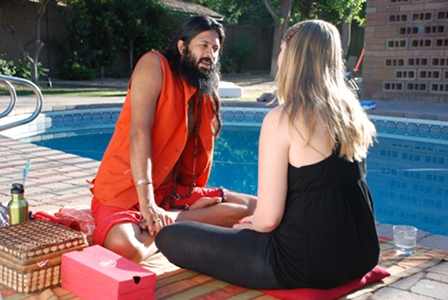The following originally appeared in MovieMaker Magazine.
In my film Kumaré, I impersonate a wise guru from the East and start a following of real people in Arizona. In order to look the part, I grew my beard and my hair to Gandolfian lengths, wore a sarong and mala beads and carried a five-foot-tall custom-made trident. I looked like the kind of reggae fan who sells oils and incense on Venice Beach. But people called me a guru, therefore I was considered one by everyone I met.
When directing a movie without a script, without a clue how it would turn out, without a genre to rely on for structural guidance, you need people to believe in you and your vision. And you have to find inspiration from wherever and whomever possible.
My six-person team and I, as the revered Sri Kumaré, spent months rolling around Arizona meeting characters who professed to have all sorts of wisdom. We had Easter with a New Age Christian priestess who was married to an Elvis impersonator, channeled Siddhartha Gautama in her backyard and gave aura readings for a small fee. We ran into a Sanskrit scholar of great academic acclaim in a Vortex surrounded by a fleet of disciples. I talked to a psychic who guessed my birthday upon my entering his consultation room — and said I was there to lay judgment on the world around me. And these encounters are all in a two-hour stop for lunch in Sedona, a place that in itself feels like a movie set.
On one journey into the desert, I met a spiritual leader named Gabriel of Urantia. To me, Gabriel lacked any detectable charisma. Yet he ruled over a vast utopian community of a hundred people who believed themselves a “cosmic family” of intergalactic descendents reunited on a farm by the Mexican border. They each had a D&D-esque name, like Amadon or Centria, bestowed upon them by their leader. For the people on the inside, “Living in the fourth dimension,” this man had the answers to the big questions of humanity. To me, a lowly 3-D outsider, his tale seemed too genre, almost cartoonish — alien abduction, divine voices, great epiphanies. To Kumaré, he was an ingenious storyteller. We all had the same question: How had he built this tiny empire? How did he get people to believe him — or, rather, in him?
As the story goes, about 10 years ago, Nancy, a statuesque and eloquent woman, decided that this man was indeed channeling the celestial deity Paladin. Why or how she interpreted his fantastic incantations for cosmic authority is beyond me. But she did. She moved into a trailer park with him. Tony from Pittsburgh renamed himself Gabriel of the planet Urantia (also known as Earth) and renamed his bride Niann. She soon found herself inviting new followers into their yurts. After that, it’s not hard to see how people could align themselves with the enigmatic pair. Their lives were inspired by a higher vision and direction, i.e., purpose and a narrative structure. Few people have these. If she believes, why wouldn’t I?
There is a fine line between a raving lunatic and spiritual leader. It is those first believers that turn a delusion of grandeur into a feasible worldview. In my case, my first believers were my producers. Luckily they were my old friends and business partners. Bryan was my classmate in Indo-Tibetan philosophy class in college. I was writing about the intersection of physics and Kashmir Shaivism, Bryan about Buddhist deities and Freud. Brendan had been an improv actor in a comedy troupe and a was master of all things production. We all worked at the television station in college on comedy programming. We were a Hindu, a Catholic and a Jew, all disgruntled by the illusions around us and driven by similar reasons. While the film features me, it is about all of us. And we want it to resonate with everyone.
Bryan and Brendan knew my flaws and my strengths perhaps better than I. They encouraged me to take improv classes, become a refined yoga practitioner, speak clearly and hone my message. Because they were educated with the same academics and laughed at the same jokes, the vision soon became our communal vision. Their initial belief in me was what allowed me to dress up like a crazy man and not feel like one. After that, we were capable of building a team without a script or any guarantees. We got a producer who worked with Sacha Baron Cohen and had studied religion like us. After, each new person came to the table with their own motivations, drawn from their own personal experience. Everyone took a leap of faith to join this crazy experiment because other people had been bold enough to. For a brief moment, Kumaré the Production was a religious movement. Perhaps the students we met in the film were open to Kumaré because they admired his believers, i.e., my film crew.
Gabriel, a cinephile and film critic, was himself in many ways an amazing director. His vision is as expansive as that of any great storyteller. He mastered making life imitate art. He created a new seductive version of reality based on communal, eco-conscious living. I loved it there. And people loved Kumaré back.
The world Gabriel had created was epic, not because of the Hobbit houses that the residents of Urantia lived in, but because it functioned on a sublime narrative that kept all his residents excited and inspired. Every day they worked on the commune, and then every night they read the next chapter from the multi-volume The Urantia Book, their holy text. He was a master at telling a story, a modern-day Scheherazade. Story keeps people happy; it creates order and purpose. ??But Gabriel was by no means perfect. Over our time together, he often forgot historic details of his own life: His kids’ names, the order of their births, the details of his “secret” alien abduction (which is clearly made public in the forward to his book).
His council of elders were quick to correct and narrate the story for him. Once Gabriel admitted to instating a vegetarian diet for the community while in his own quarters would often succumb to his craving for Italian meatballs. (Perhaps there is still a little Tony from Pittsburgh left in him.) But all of this is forgivable. Perhaps he is just doing the best he can for the world he’s created. And maybe he does communicate with the celestial being Paladin. I’ve learned not to lay judgment.
Religions, like films, are the sum of their parts and built on the work of many. They attract us more because of a seductive narrative arc than any logical truth. Kumaré the guru was merely a prop at the center of Kumaré the religion and Kumaré the film. The film is way bigger than him, or me. It was only built because the first believers got behind a vision.
In the film, I impersonate a guru. But in real life was I just impersonating a director? It’s only because other people believed in me that I became one. They maintained the vision and direction in the times when I lost mine. It’s what every low-budget independent filmmaker knows and every fallen spiritual leader painfully discovers: You need them more than they need you.
Kumaré comes out in limited release on June 20th, at the IFC Center in New York City, with screenings in Los Angeles, Boulder, Denver, Seattle and more scheduled for the coming weeks. To find out and more about the film and keep up with future screenings, visit www.kumaremovie.com.















